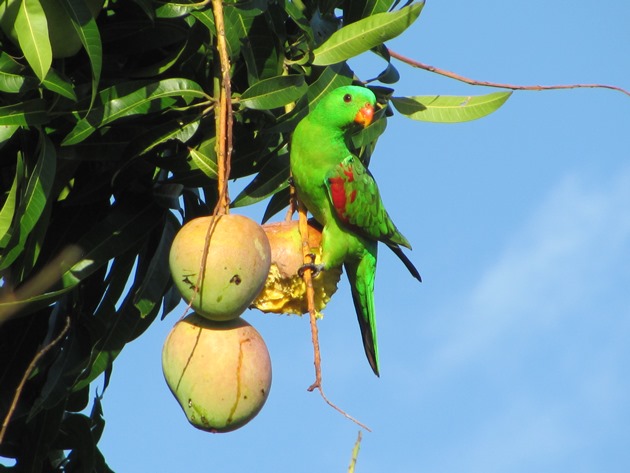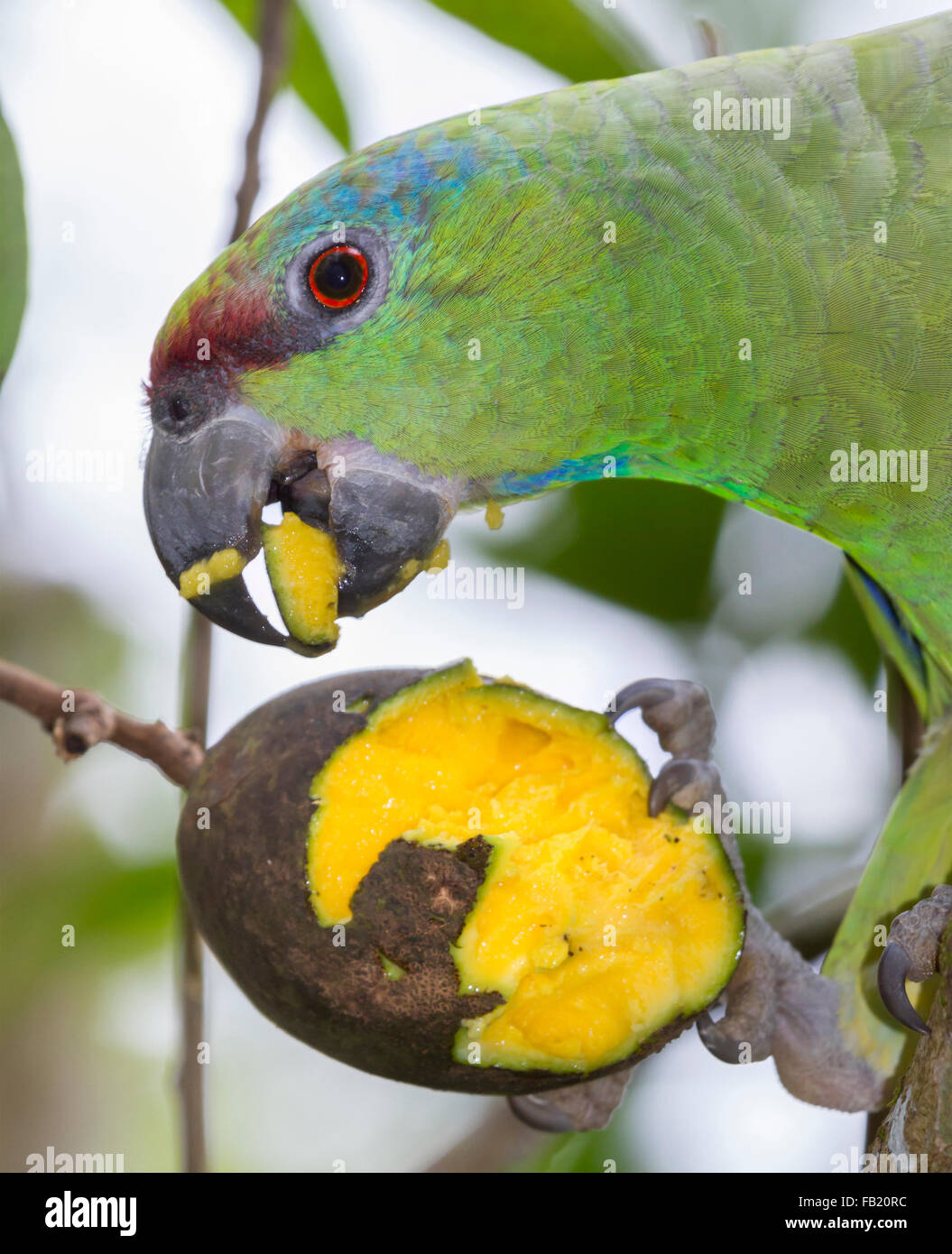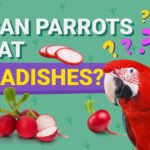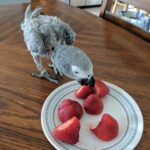Yes, parrots can eat mango. Mango is safe and nutritious for parrots when given in moderation.
Mangoes are rich in vitamins A and C, which are essential for a parrot’s health. These tropical fruits also provide dietary fiber, aiding in digestion. Always ensure the mango is ripe, fresh, and free from pesticides. Remove the pit and peel to avoid any choking hazards or exposure to harmful substances.
Offering mango as a treat can enhance your parrot’s diet, but it should not replace their regular food. A balanced diet is crucial for maintaining a parrot’s well-being. Always consult an avian vet before introducing new foods to your parrot’s diet to ensure it meets their specific nutritional needs.
Introduction To Parrot Diet
Parrots are colorful and intelligent birds. They need a balanced diet to stay healthy. Their diet should include various nutrients.
Importance Of A Balanced Diet
A balanced diet is crucial for your parrot’s health. It helps them stay active and happy. Without a proper diet, they can get sick.
Here are some reasons why a balanced diet is important:
- Boosts immune system: A variety of foods helps fight diseases.
- Improves feathers: Nutrients like vitamins make feathers shiny.
- Enhances mood: Good food keeps parrots cheerful.
Common Foods For Parrots
Parrots enjoy different types of food. Here is a list of common foods:
| Food Type | Examples |
|---|---|
| Fruits | Apples, Bananas, Mangoes |
| Vegetables | Carrots, Broccoli, Spinach |
| Nuts and Seeds | Almonds, Sunflower Seeds, Walnuts |
| Pellets | Commercial bird pellets |
Fruits are a favorite among parrots. They love the sweet taste. Vegetables provide essential vitamins. Nuts and seeds are good for protein.
Always ensure your parrot’s food is fresh. Avoid giving them spoiled food. This keeps them safe from illnesses.

Credit: www.youtube.com
Nutritional Benefits Of Mango
Mangoes are not just delicious; they are also packed with nutrients. Parrots can benefit greatly from these tropical fruits. Let’s explore the nutritional benefits of mango for your feathered friends.
Vitamins And Minerals
Mangoes are rich in essential vitamins and minerals. These can help maintain your parrot’s health. Here are some key nutrients found in mango:
| Nutrient | Benefits |
|---|---|
| Vitamin A | Supports eye health and immune system. |
| Vitamin C | Boosts immune function and skin health. |
| Vitamin E | Acts as an antioxidant and improves skin. |
| Potassium | Aids in muscle function and heart health. |
Antioxidant Properties
Mangoes contain powerful antioxidants. These help protect your parrot from free radicals. Free radicals can damage cells and lead to diseases.
- Beta-carotene: Converts to Vitamin A and promotes good vision.
- Quercetin: Reduces inflammation and supports the immune system.
- Gallic acid: Protects cells and has antimicrobial properties.
Including mango in your parrot’s diet can provide these vital nutrients. This makes mango a great treat for your bird.
Mango Safety For Parrots
Parrots love fruits, and mango is no exception. But is mango safe for them? This section will explore the safety aspects of feeding mango to parrots. Understanding which parts are safe and potential risks is essential for their health.
Safe Parts Of The Mango
Parrots can eat the flesh of the mango. The juicy, sweet part is safe and nutritious. It provides vitamins A, C, and E, which are good for their health.
Here is a table summarizing the safe parts:
| Part | Safety |
|---|---|
| Mango Flesh | Safe |
Potential Risks
Some parts of the mango can be harmful. The skin and pit contain toxins. These can be dangerous for parrots. Always remove the skin and pit before feeding.
- Mango Skin: Contains urushiol, a toxic substance.
- Mango Pit: Can cause choking and contains cyanide compounds.
How To Serve Mango To Parrots
Parrots love fruits, and mangoes are a great choice. But how should you serve mango to your feathered friend? This section will guide you on how to prepare and serve mango to your parrot, ensuring it’s both safe and delicious.
Preparation Tips
Proper preparation ensures your parrot enjoys mango safely. Follow these tips:
- Wash Thoroughly: Rinse the mango under running water to remove dirt and pesticides.
- Peel the Skin: Remove the skin to prevent any potential pesticide ingestion.
- Remove the Pit: The pit can be a choking hazard, so discard it.
- Cut into Small Pieces: Dice the mango into small, bite-sized pieces.
Serving Sizes
Serving sizes are crucial to avoid overfeeding. Use this guide to determine the right amount:
| Parrot Size | Serving Size |
|---|---|
| Small Parrots (Budgies, Lovebirds) | 1-2 small pieces |
| Medium Parrots (Cockatiels, Conures) | 2-4 small pieces |
| Large Parrots (Macaws, African Greys) | 4-6 small pieces |
Follow these guidelines for a happy and healthy parrot. Proper serving and preparation can make mango a delightful treat for your pet.
Signs Of Allergies Or Reactions
Feeding parrots mango can be a delightful treat. But it’s crucial to know if your feathered friend is allergic. Recognizing the signs of allergies or reactions is essential for their well-being. Here’s what you need to watch for.
Common Symptoms
Allergic reactions in parrots can vary. Below are some common symptoms:
- Feather Plucking: Your parrot may start pulling out its feathers.
- Red or Swollen Skin: Look for redness or swelling, especially around the eyes.
- Breathing Difficulties: Labored breathing or wheezing can be a serious sign.
- Diarrhea: Watery droppings might indicate an allergy.
- Vomiting: Your parrot may vomit after eating mango.
When To Seek Help
If you notice any of the symptoms above, it’s important to act quickly. Here’s when to seek help:
- Observe if symptoms persist for more than a few hours.
- If your parrot shows signs of breathing difficulties, contact a vet immediately.
- Continuous vomiting or diarrhea needs professional attention.
- Red or swollen skin that doesn’t improve may require medication.
Consulting a vet ensures your parrot receives the care it needs. Always prioritize your pet’s health and be vigilant about any changes in their behavior or physical state.

Credit: www.mango.org
Incorporating Mango Into Their Diet
Parrots love fruits, and mangoes are a great treat for them. Mangoes are rich in vitamins and minerals. They provide a sweet and nutritious option for your parrot. But, it’s important to feed them mangoes the right way.
Balanced Diet Plans
A balanced diet is key for a healthy parrot. Mangoes should be just one part of their diet. Parrots need a variety of foods to stay healthy. Make sure they get fruits, vegetables, seeds, and pellets.
Here’s a sample diet plan for a week:
| Day | Morning | Afternoon | Evening |
|---|---|---|---|
| Monday | Mixed Seeds | Chopped Vegetables | Fruit Mix (Including Mango) |
| Tuesday | Pellets | Fruit Mix (Apples, Bananas) | Mixed Seeds |
| Wednesday | Mixed Seeds | Chopped Vegetables | Fruit Mix (Including Mango) |
| Thursday | Pellets | Fruit Mix (Grapes, Oranges) | Mixed Seeds |
| Friday | Mixed Seeds | Chopped Vegetables | Fruit Mix (Including Mango) |
| Saturday | Pellets | Fruit Mix (Berries, Papaya) | Mixed Seeds |
| Sunday | Mixed Seeds | Chopped Vegetables | Fruit Mix (Including Mango) |
Frequency Of Mango Treats
Mangoes are sweet and should be given in moderation. Too much fruit can cause health issues for parrots. Limit mango treats to 2-3 times a week.
- Give small mango pieces.
- Mix mango with other fruits.
- Remove mango pits and skin.
Observe your parrot after giving mango. Ensure they don’t have any adverse reactions. If they enjoy it and stay healthy, mango can be a delightful treat.
Other Tropical Fruits For Parrots
Parrots love a variety of tropical fruits. Besides mango, they can enjoy many other fruits. Let’s explore some exciting options.
Pineapple
Pineapple is a sweet treat for parrots. It is rich in vitamins and minerals. Pineapple contains vitamin C, which boosts the immune system. This fruit also has bromelain, an enzyme that aids digestion.
When feeding pineapple to your parrot, remove the skin and core. Offer small, manageable pieces. Ensure the fruit is fresh and ripe. Avoid canned pineapple with added sugars.
| Nutrient | Benefit |
|---|---|
| Vitamin C | Boosts immune system |
| Bromelain | Aids digestion |
Papaya
Papaya is another excellent choice for parrots. This fruit is rich in vitamin A, which supports eye health. Papaya also has enzymes that help with digestion. It is a hydrating fruit, perfect for a parrot’s diet.
When offering papaya, remove the seeds and skin. Cut the fruit into small pieces. Ensure it is fresh and ripe. Papaya is a great addition to a balanced diet.
- Rich in vitamin A
- Supports eye health
- Contains digestive enzymes
- Hydrating for parrots

Credit: www.alamy.com
Conclusion
Parrots can safely enjoy mango as a delicious treat. Ensure it’s fresh, ripe, and free of pits. Moderation is key to avoid sugar overload. Always consult with an avian vet before introducing new foods. Including mango in your parrot’s diet can provide essential nutrients and enrich their meals.
Ryan Everhart is a passionate bird enthusiast and blogger, primarily writing on his website, Avian Whispers. His journey into the world of bird blogging began with a deep interest in parrots, a species that captivated his attention for their intelligence and social behavior. Over time, his content expanded to cover a broader range of bird species, offering insights into bird behavior, care, habitats, and conservation.
Ryan is dedicated to educating his audience, which includes both new bird owners and seasoned enthusiasts. His writing is filled with personal experiences, expert knowledge, and practical advice on bird care. Through Avian Whispers, he aims to foster a deeper appreciation for birds, emphasizing their role in nature and the joys of having them as pets.
Starting with articles focused on parrots, Ryan’s work now encompasses a diverse range of topics such as feeding, training, habitat enrichment, and bird health. His love for birds extends beyond parrots, diving into various avian species. His informative and heartfelt writing reflects his commitment to the well-being of birds and the desire to help others connect with these creatures.
As a growing voice in the bird blogging community, Ryan strives to provide a platform where bird lovers can learn, share experiences, and connect over a shared passion for avian life. His blogs are not only educational but also serve as a reminder of the importance of protecting and nurturing the bond between humans and birds.



